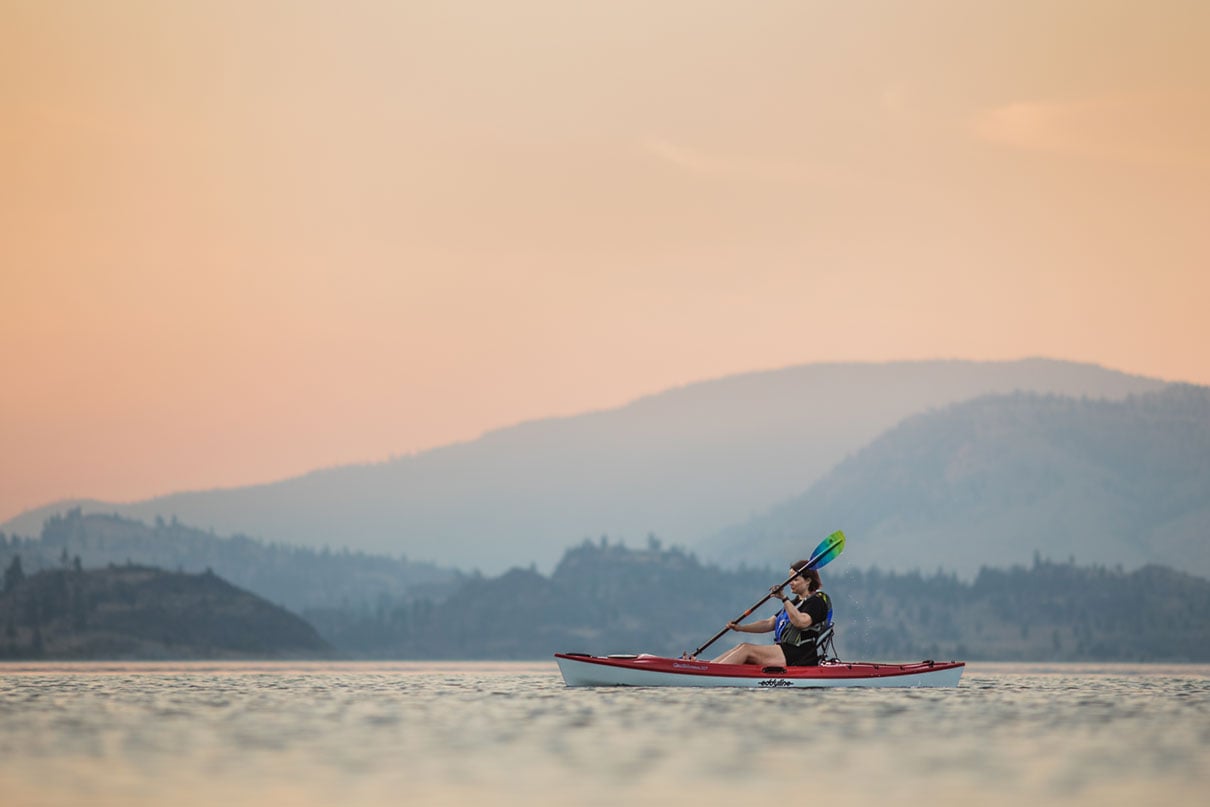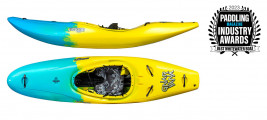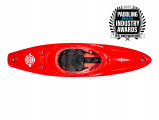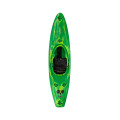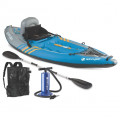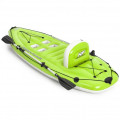Most recreational kayaks come in 8-, 10- or 12-foot lengths. Aside from youth kayaks, 8 foot kayaks are some of the shortest boats you’ll find. With an 8 ft kayak, you’ll get a kayak that turns much more quickly than a longer boat. These petite packages store easily and suit smaller paddlers like kids or shorter adults.
As a kayak’s speed is greatly influenced by its length, these shorter kayaks won’t be winning races. What 8 foot kayaks lack in speed, they make up for in portability and comfort. Any paddler with a smaller frame will be in complete control of these scaled-down kayaks. Storing and transporting an 8 foot kayak is also easier as they take up less space.
Whether you’re looking for your first kayak or your next one, if you’re considering an 8-footer, you’re in the right place. This article provides a comprehensive overview of the 8 ft kayak market, including boats from all manufacturers across the entire price spectrum. An 8 foot kayak is an excellent option for recreational paddlers looking for a sit-inside or sit-on-top kayak that performs well for casual use on calm, sheltered water.
Just a note: we will focus on recreational and fishing kayaks here. If you search elsewhere, you may also come across 8-foot whitewater kayaks. While whitewater kayaks may be the same length, they have different hull shapes and outfitting from recreational kayaks and will not share the same stability or ease of use that “rec boats” offer.
Top picks: Best 8-foot kayaks for 2025
The following 8-foot kayaks have received the highest star ratings by reviewers in our Paddling Buyer’s Guide. See and review all 8-foot kayaks here.
Best 8-Foot Kayaks

Rewind MD River Play Whitewater Kayak
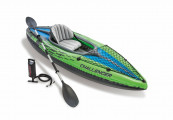
Challenger K1
Shop 8-foot kayaks
Browse our Paddling Buyer’s Guide for all the essential details on all the best 8 ft kayaks on the market. Here, you will find specifications, prices, reviews and where to buy the best 8 foot kayaks and more. It’s all in one place, saving you the trouble of jumping from website to website. Follow the links below to filter the kayaks by type, user, brand or store.
Shop by type
Shop by brand
Shopping for a used 8-foot kayak?
Getting a used kayak is a great low-risk investment, and 8 foot kayaks are already some of the cheapest boats on the market. Their widespread popularity means secondhand 8 ft kayaks are abundant, so you should be able to score a good deal on a used one.
Where should you look?
On your search for an 8 ft kayak, Craigslist, Facebook Marketplace or other online classifieds are your best bets. Use general keywords—if you search with a broad term like “plastic kayak”, you won’t miss any. If the length isn’t indicated directly, look for an “80” or “8.0” in the model name or photos.
You can also consider putting up a wanted ad at a local paddling club, or asking on the club’s Facebook page. Many kayakers tend to amass a boat collection over time, and they may have an 8 foot kayak they’d be willing to part with.
What should you look for?
Most 8 foot kayaks are made from high-density polyethylene (HDPE) or another type of robust plastic. Plastic is an ideal recreational kayak material as it is strong, inexpensive and impact-resistant. Even with frequent use, it’s unlikely that the kayak will be damaged to the point that it’s unusable. Most scratches and abrasions are superficial.
The exception is if there are cracks or holes right through the hull (bottom) of the boat. For a sit-inside kayak, these are pretty obvious to see. On sit-on-top kayaks, pick the kayak up and listen for water sloshing around inside. This is a good indicator that there is a hole in the hull.
One common cause of damage to used kayaks is the use of ratchet-style straps to secure the kayak when transporting it. People who use the ratchet straps tend to over tighten them, as the plastic bends under pressure. This can cause warping or distortion of the kayak hull. Look for damage from the ratchet straps along the sides of the kayak; bending and distortion will be obvious.
UV damage may be another potential issue with a used kayak. Storing the kayak in direct sunlight will weaken the plastic over time. Look for excessive fading on one side of the kayak, and apply firm pressure to the hull and deck. If it feels spongy or appears sun-bleached, this doesn’t mean that the kayak is unusable, but it may wear out more quickly.
Thoroughly inspect the outfitting components of the kayak, like the foot pegs, hatch, seat and seat back—it’s more likely that these will be worn or damaged. Make sure that any buckles clip, and that adjustable foot pegs (if they’re present) slide forward and backward. It’s not a deal-breaker if they are broken; you may be able to source adequate replacement parts from a general hardware store or paddling shop.
If it’s an inflatable kayak, it is imperative that you blow the boat up before buying it. In the process, listen for air leaks in the valves and tubes and watch for any stains and mold, which may reveal the kayak was stored wet. Make sure there are no missing parts; check for seat and seat back, deck rigging such as grab lines, skeg (a removable fin that slides into the hull) and pump, if included.
If the kayak is missing parts or a pump, you might be able to source replacements—but check beforehand. Many manufacturers are backlogged at the moment and there might be a delay.
What’s a fair price for an 8-foot kayak?
In the current world of supply chain delays, prices of used kayaks have shot up. This is especially true in the summer months when demand outstrips supply. If you are patient, waiting until the off-season will diminish the demand. If you are determined to get on the water immediately, prepare to pay a premium.
Overall, kayaks hold their value well. It’s rare to find any used boat listed for less than half of its original price. Generally speaking, 8 foot kayaks are pretty cheap to begin with, so you may do just as well picking up a new 8 ft kayak at an end-of-season sale.
Finally, keep in mind that taking the kayak for a test paddle is the best way to find if the 8 foot kayak works for you, in terms of performance, handling, comfort and fit.
For more tips on what to look for when selecting a used kayak, read our article How To Buy A Used Kayak.
8-foot kayak buying guide
A range of 8 foot kayaks are available across North America at big box stores, outdoors stores and online outlets. You can buy 8 foot kayaks to suit different paddling needs, including recreational paddling and fishing. This length of kayak offers supreme maneuverability, especially for smaller paddlers, in a size that’s easy to transport and store.
Start by determining what type of 8 ft kayak best aligns with your paddling goals. Kayaks are divided into categories based on type of use. These include recreational kayaks designed for casual use on sheltered water and fishing kayaks for angling in a variety of conditions. Additionally, you’ll need to decide between a model with open decks (sit-on-top kayaks) or closed decks (sit-inside kayaks). Here’s a rundown of some of the more popular types of 8 ft kayaks:
Sit-inside kayaks offer the best protection from the elements with their closed decks, especially important in colder climates. Sit-inside kayaks can also be used with a sprayskirt for full protection from waves and spray. They also tend to be lighter and offer more interior dry storage than other kayak types.
Sit-on-top kayaks are self-draining and easy to scramble back aboard after a capsize or upset. The open deck makes it simple to hop on or off, and these designs are also usually more stable than their sit-inside counterparts. The open decks make gear more accessible, making sit-on-tops the preferred style for fishing kayaks.
Recreational kayaks are ideal for paddlers who spend most of their time on calm, sheltered lakes and slow-moving rivers. This is the most common type of 8 foot kayak. With few bells and whistles, they are some of the most affordable kayaks you can buy.
Fishing kayaks resemble recreational kayaks with a few key differences. They generally have lots of storage space for fishing tackle and accessories, in addition to specialized features such as rod holders and gear mounts. Sit-on-tops targeting anglers place their seats higher to give anglers a better field of vision.
Inflatable kayaks can stuff into a duffel, making them even easier to store and transport. At the 8 foot length, most inflatables are entry-level construction and prices. These are not ultra-rigid drop stitch kayaks like some longer (and pricier) models, but they aren’t bad for a day at the beach. Expect an inflatable kayak to be slower and more prone to getting blown around by the wind than a hard-shell kayak.
After you’ve determined the type of 8-foot kayak that best matches your needs, you’ll find brand-to-brand comparisons are strikingly similar. You may want to choose a kayak from a brand that manufactures them locally or has environmental values that align with yours. Do some reading on the company website for a bit more background information. Look for subtle indicators of craftsmanship. Shoddily-built kayaks will have sharp edges or feel like they are made with flimsy plastic.
Remember, online research will only get you so far. The best advice we can offer is to always test paddle before buying any boat. If you’re buying used, you can ask to meet the seller at a location where you can get on the water; but that’s not possible at big box stores. You can also try to borrow friends’ kayaks for test paddling in real-world conditions. The more time you can spend on the water in a similar style of kayak, the better the purchasing decision you will make.
Here are answers to some of the most common online questions about 8 foot kayaks.
-
Are 8-foot kayaks good?
If you are looking for a kayak that is easy to maneuver, eight feet is a great length. These boats will spin on a dime, perfect for exploring meandering rivers, wetlands and other calm waters. An 8-foot kayak also makes for an ideal youth kayak; youngsters can easily control these kayaks without feeling like they are paddling a bathtub. Adult paddlers with smaller frames will also feel comfortable in these shorter kayaks.
-
Is an 8 ft kayak too small?
For paddlers with larger frames, an 8-foot kayak can feel too small. Long legs may not fit comfortably in 8-foot kayak cockpits. Also check the 8-foot kayak’s maximum capacity; in general, shorter kayaks will have lower weight capacities than longer ones. If you are near (or over) this capacity, look at a longer kayak. Other manufacturers may offer size charts.
If the same model is offered in 8-, 10- and 12-foot versions, think of them as “Small, “Medium” and “Large.” The best way to gauge whether or not an 8-foot kayak matches your body size is to sit in it and see how it feels for you.
The other aspect where you’ll want to consider size relates to how you plan on using the kayak. Longer kayaks are faster and better suited for covering longer distances. If you are buying a kayak to paddle with friends, check what length boats they use. An 8-foot kayak will have trouble keeping up with 14-foot day touring boats, no matter how strong the paddler.
-
Difference between 8- and 10-foot kayaks
The main difference between an 8 ft vs 10 ft kayak is glide and maneuverability. In general, a 10 foot kayak offers more glide, while an 8 foot kayak will be easier to handle. Additional storage capacity (or sitting space, in the case of a sit-on-top kayak) is another advantage of a longer 10 ft kayak.
Performance increases with length in most recreational kayak designs, so choose a longer boat if you’re looking for a better ride—just remember that a longer boat may be more difficult to handle if you’re a smaller person.
-
Who makes an 8-foot kayak?
While 8-foot kayaks are less common than kayaks in the 9- to 11-foot range, many popular recreational kayak brands like Pelican and Sun Dolphin offer 8-foot models. Lifetime makes an 8-foot fishing kayak, and Intex offers an inflatable the same size.
-
8-ft kayak weight limit
Due to their smaller design, 8-foot kayaks’ weight limits will be less than that of a 10- or 12-footer. Weight limits vary by model, but most 8-foot sit-inside kayaks’ capacities are around 200 pounds, while sit-on-tops can support a bit more, closer to 225 pounds.
-
Where can I buy an 8-ft kayak?
You can find 8-ft kayaks wherever recreational kayaks are sold. Big-box retailers like Walmart or Dick’s Sporting Goods carry the kayaks in-store, and you can purchase the boats online. Independent retailers also may carry select models of these shorter kayaks.
8-foot kayak reviews
A great next step in your buying journey is to read expert reviews of the boats you’re considering. These will lay out the comfort, performance and features of each boat, giving you an idea of whether it’s suited to your paddling aspirations. Find our reviews of 8-foot kayaks below.
Coming soon



